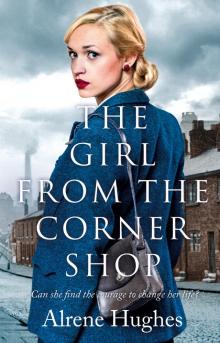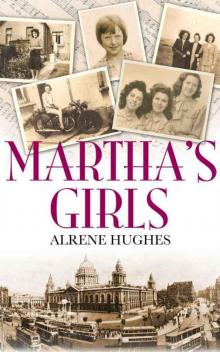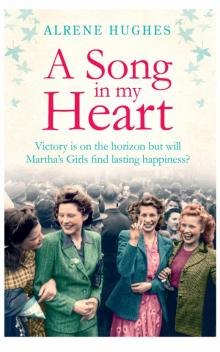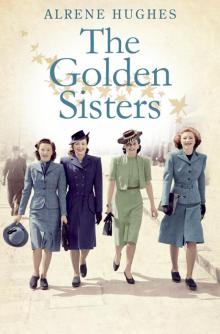- Home
- Alrene Hughes
A Song in my Heart
A Song in my Heart Read online
ALRENE HUGHES was born in Enniskillen, grew up in Belfast and now lives in Manchester. She is a member of the Manchester Irish Writers and her short stories and poetry have been published in anthologies and broadcast on radio. She was an English teacher for twenty years and now writes full time. A Song in My Heart is the final part in her bestselling trilogy of novels that consists of Martha’s Girls (2013) and The Golden Sisters (2015), both published by Blackstaff Press. The trilogy was inspired by a scrapbook of concert programmes and newspaper cuttings about her mother and her aunts, the real Golden Sisters.
A Song in my Heart
ALRENE HUGHES
Acknowledgements
My heartfelt thanks go to Patsy Horton, managing editor at Blackstaff Press, and her team for their belief in the first book, Martha’s Girls, and for encouraging and supporting me to complete the trilogy.
Thanks also to: Michael Faulkner for his editing; Carolyn Baines for all things musical; Dr Sara Farrell for all things medical; the Deruchie family for ‘Clemmie’; and special thanks to Heather Hart for everything.
Once again, I acknowledge Brian Barton’s academic insight combined with natural storytelling in his book The Blitz: Belfast in the War Years.
Last, but not least, thanks to the grandchildren of Martha’s girls: Adam, Dan, Rebecca, Andrew, Daniel. The books were written so they would get to know our family and the city they called home.
Many of the characters and incidents in this book are fictional, but the Goulding family did exist, the historical events are accurate and the Golden Sisters did sing.
Published in 2016 by Blackstaff Press
4D Weavers Court
Linfield Road
Belfast BT12 5GH
© Alrene Hughes, 2016
© Alrene Hughes, cover image, Getty Images, 2016
© cover, Two Associates, 2016
All rights reserved
Alrene Hughes has asserted her right under the Copyright, Designs and Patents Act 1988 to be identified as the author of this work.
A CIP catalogue for this book is available from the British Library
EPUB ISBN 978 0 85640 990 5
MOBI ISBN 978 0 85640 989 9
www.blackstaffpress.com
www.alrenehughes.com
This book is dedicated to the people of Belfast
Chapter 1
Martha carefully hung the dress on the kitchen door and stepped back to admire it. Mrs McKee was indeed a skilled seamstress: the skirt, cut on the bias, would swing with any slight movement and the tiny darts on the bodice would emphasise a trim waist and flatter a full bosom. The fine lawn material had used up all their clothing coupons, but it would be worth it to see Pat walk up the aisle in the pale lavender gown, so perfect against her ivory skin and rich auburn hair.
Martha had only to add the finishing touch – a design of intertwined leaves and petals to embellish the scooped neckline. She cleared the table and set out needles, scissors, thimble, skeins of embroidery thread and a bowl of milky pearls from an old necklace, all carefully washed and polished. Finally, she laid the dress on the table and began to mark with a pin the centre of each pearl flower.
The morning wore on and, with each pearl stitched in place, Martha gave thanks that her daughter had found a good man in Captain Tony Farrelly for, Lord knows, Pat deserved some happiness after all she’d been through.
Peggy was late for work, but it wasn’t her fault. How was she to know that half the US Army would be driving up Royal Avenue in convoy with policemen on point duty stopping the traffic at every junction to let them through? Mr Goldstein would no doubt roll his eyes and tut under his breath when she arrived at the music shop, but she would explain that she had left the stationary trolley-bus and walked all the way from York Street past the GIs who waved and whistled at her and never stopped once, but only smiled in acknowledgement.
Goldstein was in the shop window putting up a poster to promote his new idea. ‘Sheet Music Library’ it read. ‘Don’t buy, borrow.’ He was clearly in a good mood and did not mention that she was half an hour late. ‘Peggy! I want you to sort out all the old or dog-eared sheet music that nobody wants to buy, but might pay tuppence to borrow.’
Peggy stared at the dozens of sheet-music boxes and her heart sank.
Goldstein went on, ‘There’s a shortage of paper so the price of sheet music has increased. This is our contribution to Make Do and Mend.’
‘Why would anybody pay for grubby bits of paper?’
‘You have no head for business, Peggy. They’re not buying paper, they’re buying music as sparkling as it ever was, taking home the score and lyrics to enjoy and then they can bring them back and borrow something else. Just like books in a library.’
Peggy rolled her eyes. ‘Where’s Esther? Can’t she sort it out while I serve the customers?’
‘I’ve just sent her to the Northern Whig to place an advertisement for our concert at The Grosvenor Hall a week on Saturday and guess what?’ Peggy shrugged her shoulders and Goldstein went on, ‘The Golden Sisters will be top of the bill.’
Peggy’s mood changed in an instant and she clapped her hands in delight. She had pushed for top billing for so long and at last she and her sisters would be the stars of the show. She couldn’t wait to see the look on Pat’s and Irene’s faces when she told them and they could hardly complain if she arranged some extra rehearsals to learn some new songs, could they?
Just beyond the city centre, in Short Brothers & Harland aircraft factory, Irene had already done two hours’ work. Throughout the morning the heat from the rivets and the smell of solder and grease had built up inside the fuselage of the Stirling bomber and, although dinnertime was only half an hour away, Irene could stand it no longer. She pulled off her mask and climbed down the ladder with all the speed she could muster and crossed the factory floor. There was an angry shout from the foreman, but she ignored him and headed for the toilets out in the yard. This was the pattern of her days: late-morning sickness; afternoon weariness; unsettled nights. It didn’t help that her mother reminded her daily that being a riveter was no job for any woman, let alone a pregnant one.
When the hooter sounded for the dinner break she made her way to the canteen for dry toast and tea. Macy, the only American working in the factory, would have been easy to spot even without her stars and stripes turban, and Irene went to join her.
‘Hey girl, how you doin’?’
‘I’ll be all right when I’ve eaten this.’ Irene kicked off her shoes and put her feet up on the chair opposite. ‘I’m into the fourth month. Surely it can’t last much longer. If it does I’ll get the sack.’
‘They won’t let you go – there aren’t enough riveters as it is.’
‘That’s as maybe, but my mother or Sandy will probably nag me into leaving anyway.’
‘Have you heard anything from Sandy lately?’
‘Just a note to say he’s still waiting to hear if he can get leave for Pat’s wedding, but he’s not hopeful.’ Irene lowered her voice. ‘There’s so much going on at the base in Enniskillen, something to do with protecting the Atlantic convoys. It’s bursting at the seams down there with American and Canadian air crews and their planes, not to mention the RAF.’
‘If he does get leave, he might ask you to go back there with him.’
Irene raised an eyebrow. ‘He can ask all he likes, but I’m not living in a tin hut or a pokey cottage in the back of beyond!’
Martha embroidered all afternoon, neat little rings of petals in primrose yellow around each pearl, and as she did so she thought of William Kennedy and how, if not for a cruel twist of fate, it might have been him that Pat would be marrying on Saturday. Pat had always had a fondness for him and working tog
ether had drawn them close. But it wasn’t to be. Martha shuddered at the thought of the hell Pat went through when she and William were caught up in the Dublin bombing. His death had plunged Pat into a nervous breakdown so severe that Martha had feared her daughter would never recover. Even now, she felt a sense of amazement at how Pat had fought against a despair that frequently overwhelmed her. Then, God bless him, Tony Farrelly came along.
There was a tap on the window, the back door opened and Betty from next door cooed, ‘It’s only me.’
‘Come on in,’ said Martha, slipping the needle into the back of the neckline. ‘I was just going to put the kettle on.’
‘Well, would you look at that.’ Betty examined the embroidery. ‘So delicate. You’ve a quare talent, Martha, so you have.’
‘Ach, it’s nothing more than patience and good eyesight.’
‘Well, I’ve neither so that’s my excuse. But wait till you see what I’ve brought you.’ She felt in the pocket of her apron and pulled out a rope of pearls. ‘The catch is broken, but I thought you might need a few more for decoration.’
‘Oh Betty, that’s great. I was only just thinking it would be nice to have a few more flowers round the three-quarter-length sleeves.’
‘Will you have time to do it?’
‘I think so, everything else is ready. All that’s needed now is the signed permission forms from Tony’s commanding officer.’
‘Permission forms?’
‘Aye, apparently that’s how it works. An American soldier can’t just marry; he has to fill in a lot of forms. They wanted to know all about Pat, checking up I suppose.’
‘There’ll be no problem there then,’ said Betty. ‘They’ll soon see what a grand girl she is.’
Pat was seething. Why, today of all days, did she get stuck in a meeting when Tony was waiting outside for her so that they could go to the jeweller’s together?
Half an hour late, she ran down the steps of Stormont Buildings hoping he was still there. She needn’t have worried. He was leaning against the jeep and she felt again that somersault of her heart at the sight of his dark crew cut and broad shoulders beneath the well-pressed GI uniform. She ran towards him, and he caught her in his arms and swung her round.
‘Thought I’d been stood up there for a while, Patti.’ He laughed.
‘I’m so sorry I’m late.’ The words tumbled out of her. ‘There’s been such an argument about the evacuees. You know most of them have come back home to Belfast, but nobody’s checked up on their welfare. They couldn’t decide who was responsible. I wanted to tell them we’re all responsible, but of course I’m only a clerk. In the end they said we’d have to meet again tomorrow.’ She paused for breath and noticed the concern on Tony’s face. ‘Oh, am I too late? Is there still time to go for the ring?’
He kissed her cheek. ‘Don’t worry. Hop in and we’ll head into town and you can tell me all about your evacuees on the way.’
Tony swung the jeep in a wide arc and drove down the long avenue towards the wrought-iron gates at the bottom of Stormont Hill.
‘The problem is that so many homes were destroyed in the bombing and a lot of those still standing aren’t fit to live in. A lot of children don’t bother to go to school any more and most of them don’t get enough to eat.’
Pat talked and Tony listened. ‘I can’t help thinking that the children would have been better off staying out in the country until the houses were made habitable. But then you wouldn’t want to keep children away from their families any longer than necessary …’
Tony pulled in to the kerb and stopped the engine.
Pat looked around. ‘Are we stopping here? I thought we were going to Queen’s Arcade?’
‘We’ll go in here first,’ said Tony. ‘It’s quiet and there’s something we have to talk about.’
‘A public bar?’
‘Come on, it’s okay, you’ll see.’
The dimly lit interior was pungent with the smell of porter and, as her eyes adjusted to the light, Pat took in the elaborate surroundings. The walls were covered with decorated tiles, and ornate lanterns of stained glass were suspended from the ceiling on chains. Along one side there was a row of mahogany booths complete with doors to conceal the drinkers within and from which wreaths of smoke rose upwards to linger over their heads.
Tony found an empty booth and ushered Pat inside. Almost immediately a waiter appeared to take their order, and as soon as he had gone, Pat took one look at Tony and knew something was wrong.
‘What’s going on, Tony? What’s happened?’
His eyes never left her face as he reached out for her hand and whispered, ‘I’m so sorry, Patti, but we can’t get married.’
It should have been a shock, but it wasn’t. In fact, ever since Tony had asked her to marry him, there had been a tiny dark corner in Pat’s mind filled with the fear that it would never happen. But even though she had half expected something to go wrong, devastation overwhelmed her. ‘Tell me,’ was all she could say.
‘My commanding officer was called to London three days ago. That happens sometimes and usually he’s back within forty-eight hours, so I wasn’t worried. But it turns out that the order has been given for us to leave Northern Ireland. You know we’ve been on alert, ready to move any day now. Well, the first contingent left Belfast this morning on their way to England for final training before deployment overseas. My division is next to go.’
‘But you’re still here; we could get married before then.’
Tony shook his head. ‘He left before he could sign the papers. I haven’t got the permission to marry—’
‘But someone else could sign them, couldn’t they?’
‘Patti, that ain’t how it works and right now we’re just getting ready to ship outta here.’
‘We’ll go to the registry office in the morning—’
Tony shook his head. ‘No, it can’t be done, you have to see that. I’d be court-martialled for marrying without permission.’
And Pat felt a clawing fear that in this confined space in a public bar her future had been snatched from her. She clung to him and his embrace was so strong she felt his anguish too. When he spoke again it was as though he knew her darkest thoughts. ‘Patti, my darling, this is not where it ends for us. We knew I would have to leave soon and I hoped we would be married first, but nothing – nothing – is going to change how I feel about you.’ He lifted her chin. ‘I love you so much.’
‘But what if something happens to you? I couldn’t bear it.’
‘Oh Patti, I know the heartbreak you went through when William died, but I swear I’ll come back. You won’t be left alone a second time.’
‘You can’t say that. Nobody knows what’s going to happen. You’re a soldier!’ Pat’s voice had risen steadily.
‘Stop it!’ Tony gripped her arms. ‘I will not die. This war will end and I’ll be back to marry you. You have to be strong, Patti, you have to believe me.’
‘I want to, I really want to, but—’
‘Look, there’s still time to go to the jeweller’s like we planned and we’ll buy the ring anyway. It’ll be like a pledge.’
Pat shook her head. ‘The last thing I want now is a ring. It would be tempting fate.’
‘Okay. Okay.’ Tony wiped a tear from her cheek. ‘But as far as I’m concerned, Patti, I am your husband.’
Pat took his hand from her cheek and brought it to her lips. ‘And I’m your wife,’ she whispered.
They left the Crown Bar and walked through the gathering dusk to the City Hall and as they walked they talked about the future they would have together. Tony told her again about his home town. ‘I know a little fixer-upper a few blocks from the ocean: wraparound porch, big magnolia tree in the backyard. You’ll love it. It’s been empty a while, but I’m gonna write my sister to find out if it’s still for sale. I could put down a deposit.’
They sat on a bench close to Victoria’s statue, just a girl who cried a little and her GI who
comforted her and tried to make her laugh. They held each other and kissed and talked and talked.
Slowly the moon rose and Pat forced herself to ask, ‘When do you leave?’
‘Tomorrow early.’
‘You need to get some sleep then,’ said Pat and she stood to go.
He caught her hand. ‘Stay a bit longer, please.’
‘It’s time, Tony.’
He knew that too. ‘I’ll drive you home.’
‘No, I’ll be fine.’ She reached up and put her arms around his neck and saw all the love in his eyes and at that moment she believed absolutely that they would be together. The world would not be so cruel as to take him from her.
He held her in his arms and kissed her tenderly, the sweetest of sorrows. ‘I love you,’ he whispered as he let her go.
She held back the tears and smiled. ‘I’ll be waiting for you.’ Then she turned and walked away.
In the late afternoon, Martha dug up some carrots, parsnips and potatoes and gave thanks again that Betty’s husband Jack had helped her clear an area of the back garden last year to grow vegetables. He had given her fruit bushes too and advised her to leave the brambles at the bottom of the garden to multiply in the hope of a good crop of blackberries. ‘There’s a lot to be said for Digging for Victory,’ Jack had told her. ‘It’ll make your rations go much further.’
She had a big pot of stew on the range: the bit of beef skirt with the vegetables, along with the wheaten loaf she had baked, would fill the girls up after their days’ work. As usual, Sheila was first home. Working in the office meant she finished half an hour after school ended and it didn’t take her too long to cycle up Cliftonville Road from the Royal Academy. She was no sooner in the door than the complaining began. Martha could have set her clock by it.
‘I’m fed up with that place, so I am. That woman has it in for me, you know.’
‘What’s she done this time?’
‘Just because I didn’t finish the filing from yesterday she said I should have come in early this morning. She forgets I didn’t get it finished because she had me checking her bookkeeping. Then to put the tin hat on it she was showing off her new clothes and saying wasn’t it a pity I only had the one skirt to wear to work.’ Sheila took the lid off the saucepan and sniffed. ‘Is it stew again?’

 The Girl from the Corner Shop
The Girl from the Corner Shop Martha's Girls
Martha's Girls A Song in my Heart
A Song in my Heart Golden Sisters
Golden Sisters